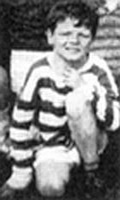
An inquest has been ordered to be reopened after new evidence was uncovered about the death of the first child killed by a rubber bullet in the north of Ireland.
Seventeen people have died in the north of Ireland at the hands of rubber or plastic bullets, including seven children, and hundreds injured. The weapons continue to be used by the Crown Forces as a form of crowd control during ‘public order’ situations.
Schoolboy Francis Rowntree, known to his family as Frank, died in 1972 after being struck in the head with rubber baton round that it is believed had been ‘modified’ in order to make it more deadly.
The 11-year-old from Lower Clonard Street in west Belfast sustained catastrophic head injuries after being hit as he played with a friend close to Divis Flats in April 1972.
At the original inquest held in October 1972 the soldier who fired the fatal shot from the Royal Anglian Regiment, known only as ‘soldier B’ was not called to give evidence and instead a statement taken by military police was produced at the hearing.
A witness has now came forward to say that within minutes of the shooting, the soldiers involved appeared to be searching the scene for the fatal round which was be lieved to have been hollowed out and a battery placed in side the rubber casing.
Soldier B claimed the bullet ricocheted off a lamppost. However, a recent forensic reexamination of the fatal injuries by state pathologist Professor Jack Crane undermines this account and suggests that the child was shot directly at close range.
A Historical Enquiries Team report into the shooting confirmed that he was an “innocent bystander who posed no threat whatsoever to the soldier”.
In a letter to the family, Six-County Attorney General John Larkin said that having considered all new evidence, “I have concluded that it is advisable that a fresh inquest be held into the death of Francis Rowntree and I so direct”.
Frank’s brother Jim said the family were relieved to hear that a fresh inquest would now be held. “Frank was just an innocent child and yet the army tried to blacken his name saying he was involved in a riot,” Mr Rowntree said.
“My parents were told by a consultant in the Royal that his head had been crushed like an eggshell.
“An apology would go a long way to healing the hurt. My Mum is 86 and so ifs important for her that we have this inquest now.”
The family’s solicitor, Padraig O Muirigh, said the decision by Mr Larkin was a ”significant step forward for the family’s quest for truth”.
“In 1970 an agreement was reached between the British army and the chief constable of the RUC, whereby the interviewing of soldiers involved in the death of Francis Rowntree was carried out by the Royal Military Police,” Mr O Muirigh said.
“There was nothing approaching a proper police investigation into the incident.”
![[Irish Republican News]](https://republican-news.org/graphics/title_gifs/rn.gif)
![[Irish Republican News]](https://republican-news.org/graphics/title_gifs/harp.gif)

